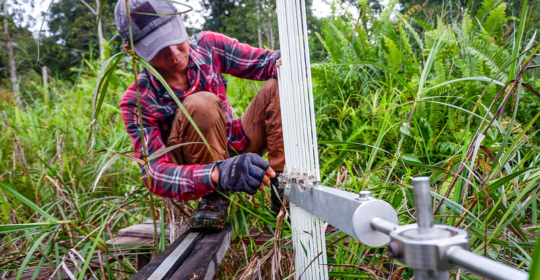Accountability Needs All of Us
21/04/2023
Blog by Natasha Matic, Ph.D., Executive Director of the Accountability Accelerator.
At a recent event during the UN Water Conference in New York City, when I stood up to present the Accountability Accelerator and said: “so here comes the boring part,” everyone in the audience laughed in sympathy.
Accountability is not ‘sexy.’ You can’t take inspiring photos of it, and it requires meticulous hard work on complicated topics, but I still love it. I know that without a well-functioning accountability system, we will not progress towards the safe and just future so many of us are striving to achieve.
Large-scale, systemic environmental problems, such as the climate crisis, water pollution, air pollution, and mass species extinction, resulting from our extractive economies and over-consumption will not be solved without far greater government and corporate accountability for environmental harm.

And there are plenty of available frameworks and targets aiming to halt and reverse the damage we’ve done, but these alone are not enough. Nor is the disclosure of our impacts and dependencies on nature or the climate.
We need a tightly woven web of accountability actors working together to provide a comprehensive solution of support and pressures.
Turning the corner for change
I sense – and I’m not the only one – a huge wave of enthusiasm and excitement that somehow we are finally turning the corner towards a different sort of capitalism than we’ve had in the past: You’d be hard-pressed today to find a CEO or a major investor who does not at least pay lip service to the idea of corporate action on at least one sustainable development goal beyond their usual earnings targets. Corporates largely understand the need to support their workers and steward the environment in which they operate (including in their supply chains) to maintain business continuity. But the key word here is ‘somehow’.
Energy and enthusiasm can only take us so far. That ‘somehow’ requires an army of ‘accountability warriors’ using a variety of tools and pulling a variety of levers: from data and standards, to finance, campaigns, technology, as well as laws and regulations.
That “somehow” is accountability: holding corporates – and governments – to account for the promises they make. I don’t see accountability as putting a target on companies’ backs as they navigate the myriad of competing sustainability demands. It’s not just naming and shaming. Accountability should not be a dirty word for companies to fear and avoid.
Accountability is about incentivizing, corralling, supporting, raising awareness, building capacity, benchmarking, monitoring, reporting, verifying, and disclosing. It about supporting companies on their sustainability journey. The more we can focus on “carrots” the fewer “sticks” we will need to wave about. The more companies understand the real risks of underpaid workers and polluted waterways, the more likely they are to adopt meaningful changes.
What we need to make accountability work
To make companies more accountable, we need three key things.
First, we need clear, standardized targets, metrics, frameworks, guardrails, and other tools that we can use to support and track a company’s progress. Many of these we already have.
Second, we need a strong accountability architecture and actors that demand action, building upon the data findings and framework insights, for example. Many of them are already ready.
Many hundreds of NGOs are already working globally to ensure that companies deliver on their commitments. I think of global actors like Ceres and the World Benchmarking Alliance, which is now setting nature related benchmarks. And I think of local action by NGO’s like ProDesc in Mexico, which is using human rights laws to protect indigenous peoples and the environment from corporate action as just a few examples.
We need both global and grassroots action. We also need the strategies and paths for the Global Biodiversity Framework to connect to local action.
Third, we need all these actors to be aligned and well-coordinated, and for this, we need funding. Without resources to strengthen and nourish the connective tissue between the various groups, the effective, interconnected accountability system we need cannot exist.
And there is a huge funding gap for this critical ‘in between’ work, which means the door remains open for business as usual greenwash, backsliding, and further, devastating harm to the global commons just when we urgently need transformative change.
The Global Commons Alliance’s Accountability Accelerator is the only grant-making organization focused intentionally and entirely on strengthening and supporting global accountability efforts on nature, aiming to plug the gaping holes in the system.
So far, in less than a year, GCAA has given a dozen grants to accelerate disclosure and action, but we have a waiting list of over fifty+ organizations asking for and waiting for funding to deliver this crucial work.
These organizations range from groups working on creating guardrails for corporate directors, to those helping a local organization in Mongolia determine which laws can be used for environmental protection, to an organization working on educating young influencers on the science behind science-based targets for companies so they can create data-driven campaigns globally.
The resourcing needs are huge, and our resources are still very small. So next time we complain about greenwashing, let’s remember that there are already many solutions out there to put a stop to it, but they remain fragmented, misaligned, or mostly underfunded. It’s time to take a systems approach.
Whoever we are, wherever we are, we all share something in common: the interconnected systems that maintain a stable and resilient planet – and keep us alive.
To ensure a safe and just future for all of us, for human wellbeing and the global economy, we should be more than willing to invest in accountability. You see, it’s not actually boring at all. It’s the underpinning and safeguarding for all our action.
